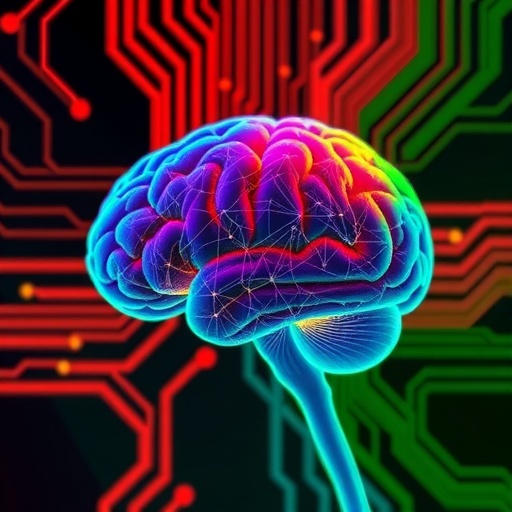PROTECT YOUR DNA WITH QUANTUM TECHNOLOGY
Orgo-Life the new way to the future Advertising by AdpathwayIn an era where artificial intelligence increasingly plays a pivotal role in healthcare, a recent study has emerged from China, revealing significant findings regarding an AI-assisted diagnostic system. This groundbreaking research, led by a team comprising Z. Kong, D. Kong, and J. Kong, provides an in-depth performance evaluation of an AI system tailored for diagnostic purposes. The study, published in BMC Health Services Research, underscores the potential of AI technology in enhancing diagnostic accuracy and streamlining healthcare processes.
Understanding the complexities of healthcare diagnostics has never been more urgent. Traditional methods, often reliant on human expertise and experience, can sometimes lead to errors or oversights. The study highlights how AI can significantly mitigate these risks. Through machine learning algorithms, the system is designed to analyze vast amounts of patient data, trends, and outcomes to offer real-time diagnostic support. This technology aims not only to assist healthcare professionals but also to improve patient outcomes across diverse demographics.
Central to the research is the methodology employed in evaluating the performance of the AI diagnostic system. The performance metrics utilized by the researchers focus on sensitivity, specificity, and overall accuracy. Sensitivity measures the system’s ability to correctly identify patients with the disease, while specificity assesses its accuracy in recognizing those without the disease. The researchers meticulously documented these parameters, providing a robust framework for understanding the AI system’s efficacy in a clinical setting.
In the wake of the COVID-19 pandemic, the demand for innovative healthcare solutions has surged. The study capitalizes on this momentum, showcasing the AI system’s capabilities in diagnosing a range of conditions. Researchers conducted tests across various hospitals, allowing for a diverse representation of data. This comprehensive analysis revealed promising results, indicating that the AI system could significantly enhance the diagnostic process, potentially freeing up valuable time for healthcare professionals to focus on patient care.
One of the standout features of the AI-assisted diagnostic system is its ability to learn from new data continuously. Unlike static diagnostic tools, this system adapts and evolves, refining its algorithms as more data becomes available. This characteristic not only ensures that the system remains relevant but also enhances its accuracy over time. The implications of this adaptability are profound; as medical knowledge grows, so too does the AI’s capacity to provide precise diagnostics, ultimately bridging the gap between technological advancements and clinical needs.
Throughout the study, ethical considerations surrounding the deployment of AI in healthcare were also at the forefront. The researchers advocated for establishing standards and guidelines to ensure that AI systems are equitable, transparent, and accountable. Moreover, they emphasized the necessity of integrating AI training into medical curricula to prepare future healthcare professionals for a landscape increasingly dominated by technology. Ensuring that clinicians are well-versed in using AI systems can promote more effective collaboration between humans and machines.
Engagement with healthcare professionals during the study further enhanced its credibility. The researchers conducted surveys and interviews, gathering invaluable feedback from clinicians who worked alongside the AI system. This qualitative data provided insights into how the system was perceived within clinical environments, revealing both enthusiasm and apprehension about fully integrating AI into everyday practice. Addressing these concerns is essential for fostering trust and ensuring the successful adoption of AI technologies in healthcare.
The team’s findings have wide-reaching implications not only for China but also for global healthcare systems grappling with similar challenges. As nations continue to battle a myriad of health concerns exacerbated by aging populations and resource limitations, AI presents a solution that could streamline operations and enhance patient care. The study serves as a powerful reminder of the necessity for collaboration between technology developers and healthcare providers to ensure that AI tools are effectively designed and implemented.
Furthermore, the study’s authors argue that the positive performance results of the AI-assisted diagnostic system should encourage policymakers to invest in further development and integration of such technologies. With healthcare budgets increasingly strained, leveraging AI’s capabilities could lead to considerable cost savings and improve health outcomes on a large scale.
The publication of this study comes at a crucial time when the conversation around healthcare innovation is gaining momentum. Researchers and healthcare leaders are looking for viable solutions that harness the capabilities of AI while remaining mindful of the importance of human oversight. The team’s work contributes to this ongoing dialogue, urging stakeholders to adopt a balanced approach that respects the intricacies of diagnosing patient health while utilizing the advantages technology offers.
In conclusion, the performance evaluation of the AI-assisted diagnostic system in China presents significant advancements in the field of medical diagnostics. As artificial intelligence continues to transform healthcare, studies like this are pivotal in shaping the future of diagnostics. They not only highlight the potential of AI to save lives and improve care but also serve as a call to action for integrating such innovations into healthcare protocols. As we stand on the brink of a technological revolution in medicine, the insights garnered from this research will undoubtedly resonate across borders, inspiring further inquiry and exploration in the field.
In summation, the study led by Z. Kong and colleagues elucidates the promising capabilities of AI in diagnosing health conditions. The careful evaluation of performance metrics shines a spotlight on the potential advantages while addressing necessary ethical considerations and healthcare professional engagement. As the healthcare landscape continues to evolve, integrating AI technologies holds the promise of enhancing diagnostic accuracy and patient care.
Subject of Research: Evaluation of AI-assisted diagnostic systems in healthcare.
Article Title: Publisher Correction: The performance evaluation of the AI-assisted diagnostic system in China.
Article References:
Kong, Z., Kong, D., Kong, J. et al. Publisher Correction: The performance evaluation of the AI-assisted diagnostic system in China.
BMC Health Serv Res 25, 1320 (2025). https://doi.org/10.1186/s12913-025-13530-x
Image Credits: AI Generated
DOI: 10.1186/s12913-025-13530-x
Keywords: AI-assisted diagnostics, healthcare, machine learning, sensitivity, specificity, patient outcomes, ethical considerations, healthcare innovation.
Tags: AI diagnostic system evaluationAI research in health servicesenhancing healthcare with technologyhealthcare artificial intelligence in Chinahealthcare process optimization with AIimproving diagnostic accuracy with AImachine learning in diagnosticspatient outcomes and AI technologyperformance metrics in AI healthcarereal-time diagnostic support systemssensitivity and specificity in AI diagnosticstraditional vs AI diagnostic methods


 3 hours ago
8
3 hours ago
8





















 English (US) ·
English (US) ·  French (CA) ·
French (CA) ·